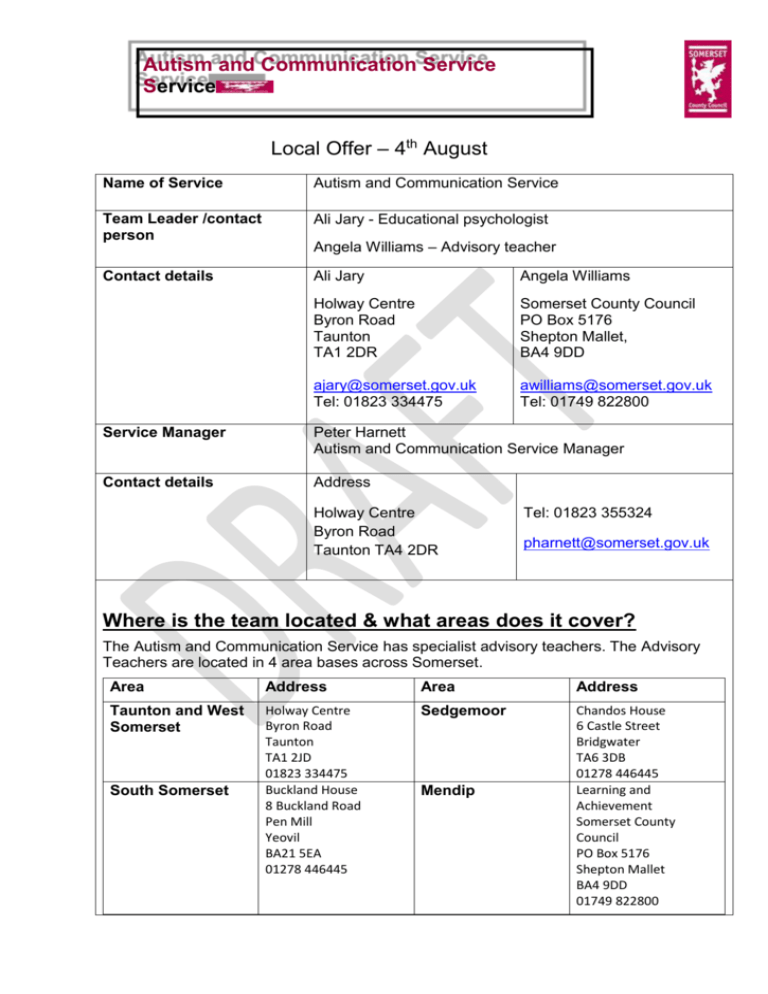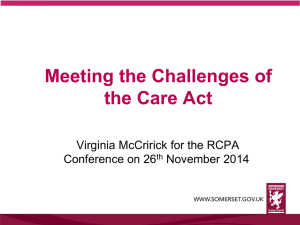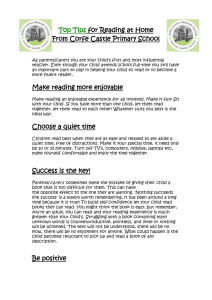Autism and Communication Service
advertisement

Autism and Communication Service Service Local Offer – 4th August Name of Service Autism and Communication Service Team Leader /contact person Ali Jary - Educational psychologist Contact details Ali Jary Angela Williams Holway Centre Byron Road Taunton TA1 2DR Somerset County Council PO Box 5176 Shepton Mallet, BA4 9DD ajary@somerset.gov.uk Tel: 01823 334475 awilliams@somerset.gov.uk Tel: 01749 822800 Angela Williams – Advisory teacher Service Manager Peter Harnett Autism and Communication Service Manager Contact details Address Holway Centre Byron Road Taunton TA4 2DR Tel: 01823 355324 pharnett@somerset.gov.uk Where is the team located & what areas does it cover? The Autism and Communication Service has specialist advisory teachers. The Advisory Teachers are located in 4 area bases across Somerset. Area Address Area Address Taunton and West Somerset Holway Centre Byron Road Taunton TA1 2JD 01823 334475 Buckland House 8 Buckland Road Pen Mill Yeovil BA21 5EA 01278 446445 Sedgemoor Chandos House 6 Castle Street Bridgwater TA6 3DB 01278 446445 Learning and Achievement Somerset County Council PO Box 5176 Shepton Mallet BA4 9DD 01749 822800 South Somerset Mendip 1. Who does your service provide for? We provide support for children and young people with autism and communication needs, their parent carers and schools, academies and free schools. There needs to be evidence of particular needs for the service to be involved. How can I start using the service? For initial concerns parent carers should speak to their child’s class teacher or form tutor. If parent carers consider that their child would benefit from advice and support from this service they should speak to the school’s SENCO. Referrals to this service come from SENCOs in liaison with and consent from parent carers, via a referral form. Parents are able to request consultation with the service: however, this should be done in conjunction with the school What does your service do? We offer training and advice to all schools. Promote an autism and communication friendly approach for all schools and settings. All schools in Somerset have access to the guidance in the Inclusive Communication Framework (**link**) this helps everyone understand the graduated response to meeting needs. We meet pupils, parent carers and teachers, to discuss strategies to address the needs of these pupils, whether academic, or personal and social We support schools to raise standards of achievement, communication skills and social and emotional skills through the provision of high quality specialist support We support schools in building their capacity to meet a wide diversity of autism and communication needs We work with educational psychologists, speech and language therapists, occupations therapists, CAOT, CAMHS and Parent Partnership paediatricians, social care workers and others.....? We provide for up to 70 pupils with Autism and Communication needs in specialist centres on school sites and in 2 centres which are not on school sites We provide training for parents and carers in collaboration with CAOT and other agencies What is our approach to supporting children and young people with autism and communication needs? Our approach focuses on: early identification of the strengths and barriers to learning for children and young people; ensuring schools have access to a range of strategies and intervention to enable children and young people to be fully included and obtain good outcomes working with parent carers and other professionals as a “team around the child”. How do we consult with parents and/or children and young people about their needs? When working with a pupil/student we always consult with parent carers as well as ascertaining the views of the young person. Parents are always offered the opportunity of a face to face meeting. Pupils/students in schools are asked their views on what they like best about school and what they find difficult as well as what works for them in the classroom. We liaise with other agencies who may be involved. Following the visit a feedback is given to the school and parents. What additional learning support is available for children and young people? ** add later** How do we evaluate the effectiveness of our support? We use a variety of ways to evaluate how effective our support is for individual children. These include:- Parent carer questionnaires Discussion with school staff Pupil/student views Monitoring and evaluating focused interventions which have been recommended Multi-disciplinary Consultation meetings where individual children may be discussed How are decisions made about the support offered to parent carers and individual children? Schools prioritise the level of involvement required through discussion at Multidisciplinary Consultation Meetings. The work might involve discussion, individual pupil/student work or staff training. How do you communicate with service users and how are they involved in decision making/planning? We work with Parent Partnership and the Parent carer Forum This service produces an annual newsletter which can be accessed by parents via the local authority website. (insert link The opinions of parent carers and young people are sought through discussion and via questionnaires. What is the experience and training of the staff in The Autism and Communication Service? The advisory team are all trained specialist teachers. All have had level 3 Autism Education Trust (AET) training. All have received level 1 safeguarding training. The continuing professional development needs of staff are identified through the annual review process. How do I complain or make positive comments ? In the first instance parent carers should raise any concerns or comment about anything related to the service received for their children through discussion with the advisory teacher involved with the child or the team leader. How can I get more information? Contact us directly via phone or e mail Via website (link to website)





